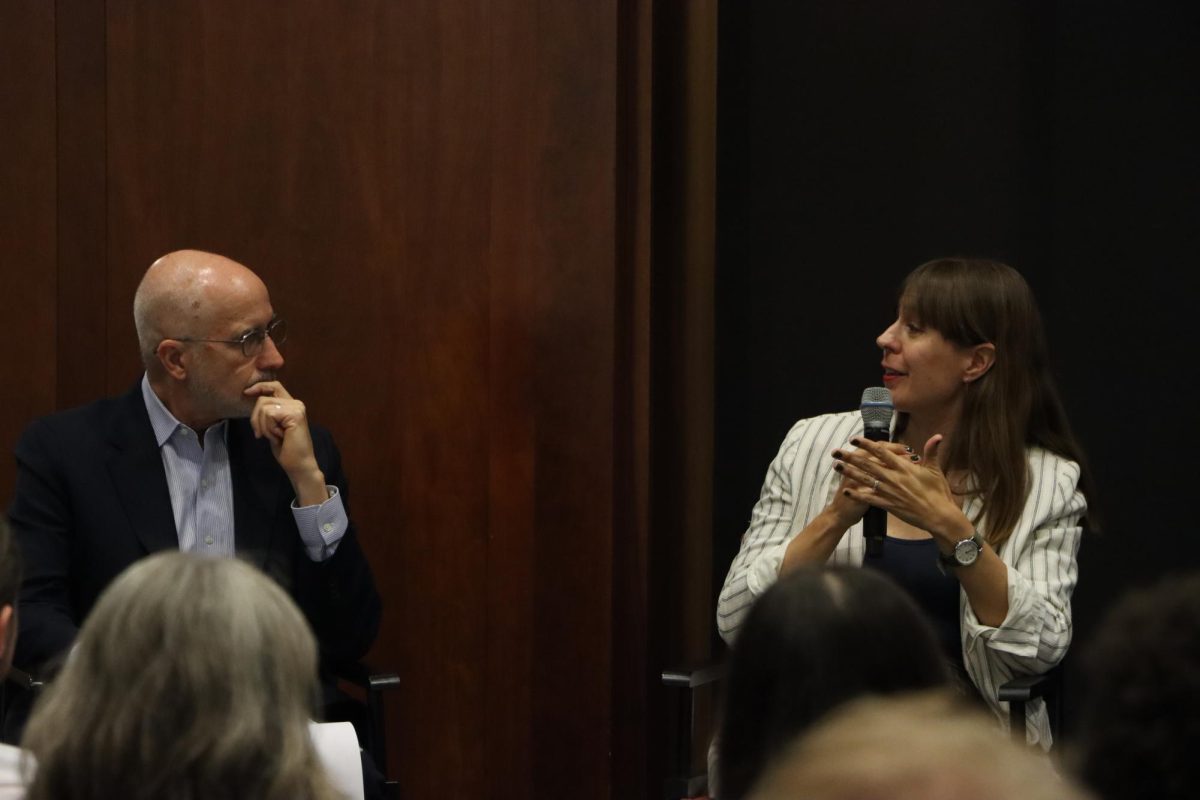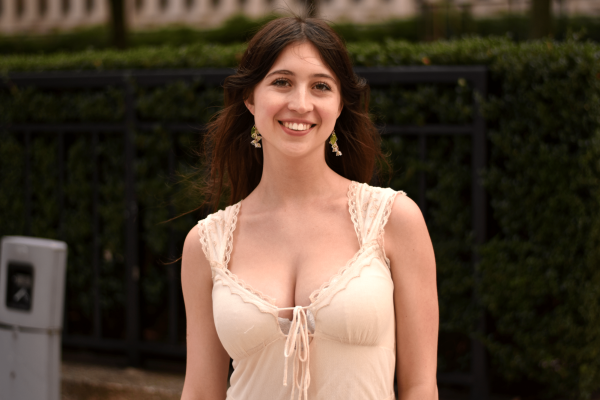Fordham’s Center on Religion and Culture (CRC) hosted a panel discussion featuring Emmy-nominated screenwriter and playwright Dorothy Fortenberry on Oct. 29. Moderated by CRC Director David Gibson, Fortenberry discussed her screenwriting process, and how her Catholic faith and passion for combating climate change impact her work.
Fortenberry is most well-known for her work as a screenwriter and producer on Hulu’s “The Handmaid’s Tale” and Apple TV’s “Extrapolations.”
To open the panel, Fortenberry shared her rather unusual start to screenwriting, beginning in theater writing plays as a young adult. She said there was a time she saw one of her plays performed that was a true “a-ha” moment.
Later in life, Fortenberry moved to Los Angeles, CA and switched from theater to television for both pragmatic and personal reasons.
“This is how I’m supposed to fit into this process. This is where I feel right … It was a very moving feeling,” Fortenberry said.
Later in life, Fortenberry moved to Los Angeles, CA and switched from theater to television for both pragmatic and personal reasons. She got involved in screenwriting through the now-defunct free, year-long Warner Bros. Television Workshop, which offered a bootcamp on how to write for television. Applications were open to anyone who submitted a script for a fake episode of a TV show that was currently airing. After the year was up, any Warner Bros. produced show was incentivized to hire participants as free hires for a 13-week audition period.
This was how Fortenberry was recruited to work on the mid-2010‘ post-apocalyptic show “The 100.” The basic premise is that after a nuclear apocalypse wipes out almost all human life, the last remaining survivors are living on a spaceship. The ship’s life support begins to fail, and they send down 100 juvenile delinquents to Earth to see if the planet is habitable.
“There are exactly 100 kids in baby jail on the spaceship, and they’re all very attractive, so they send down just the most hot criminals,” Fortenberry said with a laugh.
Fortenberry left “The 100” halfway through season three after the birth of her second child. At that point, the Writer’s Guild had no parental leave (which was amended in the 2017 contract), but she soon received a phone call from television writer Bruce Miller to work on “The Handmaid’s Tale.”
She then highlighted a brief clip from the show to illustrate the drastically different demands between writing for theatre and television. Fortenberry said that perhaps the most challenging aspect of that transition for her was the fast-paced nature of TV. She had to boil down the relationship between the two characters and one character’s entire backstory and childhood in a page and a half.
“I was coming from having 90 minutes with my audience, and with ‘The 100,’ it’s six acts and a teaser, so every five pages you’re cutting to commercial … They’re (the audience) about to go watch a bunch of Clearasil ads. If you haven’t made it exciting enough, they will not come back,” Fortenberry said.
Fortenberry left “The 100” halfway through season three after the birth of her second child. At that point, the Writer’s Guild had no parental leave (which was amended in the 2017 contract), but she soon received a phone call from television writer Bruce Miller to work on “The Handmaid’s Tale.”
In a somewhat recurring theme of Fortenberry’s career, “The Handmaid’s Tale” is another post-apocalyptic show. She faced unique challenges in adapting the 1985 novel to the screen: the protagonist in the book has rather limited knowledge of the world around her.
“If you’re making a TV show, you actually can’t be in perspective. You have to show the whole world, so we end up showing a lot more of the world than the book did,” Fortenberry said.
In the context of her Catholic faith, Fortenberry described Hollywood as having a real value of tolerance for people of all faiths. However, she acknowledged the difficulties that can arise when one has to represent a particular identity as a monolith.
She described the writer’s room for “The Handmaid’s Tale” as an incredibly diverse environment representing women from all religious (and non-religious) backgrounds to answer questions like, “What does it mean to have a female body, and why might somebody believe in God? What does it mean to have a female body and be part of a patriarchal religious institution?”
In the context of her Catholic faith, Fortenberry described Hollywood as having a real value of tolerance for people of all faiths. However, she acknowledged the difficulties that can arise when one has to represent a particular identity as a monolith.
“In a writer’s room, it’s always hardest if you are the only one of any kind of identity because then you get put on to represent that identity in a way that is impossible,” Fortenberry said.
After working on four seasons of “The Handmaid’s Tale,” Fortenberry transitioned to the Apple TV+ show “Extrapolations.” Set after a climate change disaster, each episode of the anthology series is set in a different year and country, and a cast packed with stars like Daveed Diggs and Meryl Streep. She described it as “‘Black Mirror’ for climate change.”
“‘The very hot and the very famous are the ones who survive’ is what you’re learning today,” Fortenberry joked.
Fortenberry got the job quite unconventionally. She had long been frustrated with the lack of representation of climate change in film and television. She said her passion for these issues are heavily influenced by Pope Francis’ statements in his encyclical “Laudato Si.”
“Christmas episodes and holiday movies all have snow even when it doesn’t snow in those places anymore. Our television climate sticks to a non-climate-changed world, and it’s just out of step with our reality,” said Fortenberry.
Fortenberry recalled how she often expressed these frustrations online, which unexpectedly prompted invitations to panels about climate change. In 2020, Fortenberry spoke at a panel on climate in storytelling organized by the Natural Resources Defense Council with Scott Burns, the showrunner for “Extrapolations.” Immediately after, he asked her to be his co-showrunner and executive producer, and she jumped at the opportunity.
“Extrapolations” was unique in that it did not have a traditional writer’s room. Writers were not coming together to figure out the beats, main events, in an episode. Instead, each episode had a different writer who wrote the script based on paragraph summaries. This allowed the show to explore the topic from many different perspectives.
Being an executive producer instead of a writer was a new role for Fortenberry. She described the process of doing a global search for an actor who was both South Asian and had a disability for one of the characters. Not only did she have to cast him, but she also had the responsibility of sorting out his visa application process. This position presented new challenges for Fortenberry, but, while she missed writing, she stated that being an executive producer was still very enjoyable for her.
She explained that she admires “Laudato Si” because it has a “deep love” for humanity while still discussing and criticizing issues of climate change. “I did not want to make a show where people were the problem,” she said.
Fortenberry reflected on staying positive while working with heavy subjects like climate change on “Extrapolations.”
“For me, climate despair comes from inaction. As long as I feel like I’m doing something, whatever that is, whether that’s working on this giant fancy show or tweeting into the wilderness, I am less filled with despair than when I am inactive,” Fortenberry said.
Fortenberry’s rapid switches between humor and insightful commentary on her writing charmed the panel’s attendants. Her strong values and passion for change shine through in all of the work she discussed.
Fortenberry’s journey illustrates her storytelling ability and underlines the intersections between art, faith and social responsibility.


